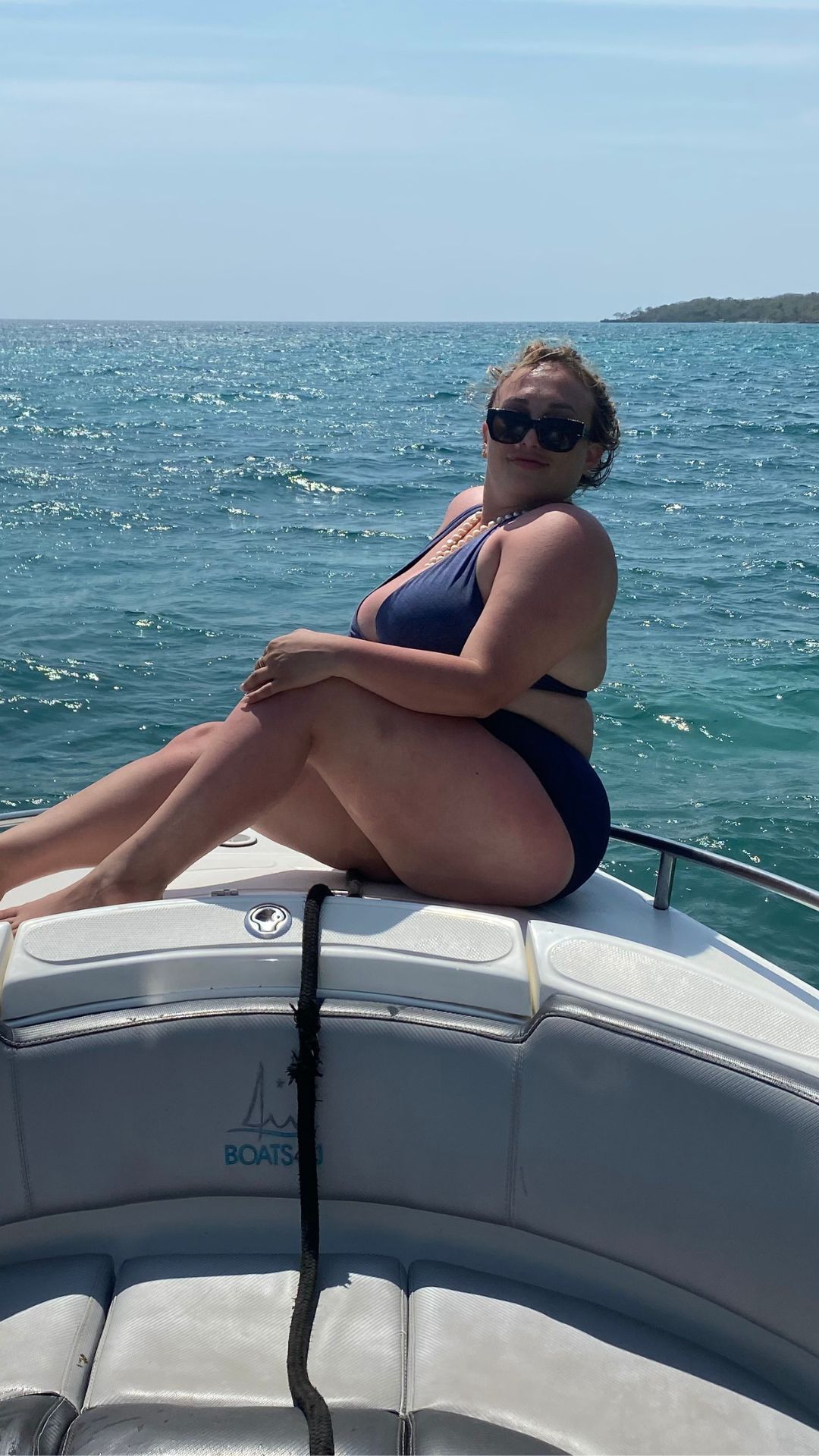
Celebrity news, beauty, fashion advice, and fascinating features, delivered straight to your inbox!
You are now subscribed
Your newsletter sign-up was successful
By now, you'll have heard of Ozempic - the diabetes drug which prompts pretty drastic weight loss that Kim Kardashian reportedly took to fit into that Marylin Monroe dress at the Met Gala.
The use of the drug has been fiercely debated - many question whether the injectable drug is yet another diet fad or a genuinely sustainable way for those with type 2 diabetes and obesity-related comorbidities to manage their symptoms. That aside, today it's been confirmed that scientists are studying medications with semaglutide, including Ozempic and WeGovy, to see if they can help ease dementia and addiction symptoms.
Just last month, Novo Nordisk - the company that produces Wegovy - confirmed that the injection can reduce your risk of cardiovascular conditions like heart attacks by as much as 20%. That said, scientists remain sceptical about whether it's the jab reducing your risk or the weight loss that it causes.
Dr Christian Hendershot, Director of the University of North Carolina research programme conducting one of the studies, said: “We know that drugs in this class are remarkably effective for several important health outcomes – many of which can influence longevity and quality of life."
“[That said], there is a sense that some of this might be too good to be true.. any potential benefits should be investigated.”
Here at Marie Claire UK, we pride ourselves on painting the full picture - and, while the dieticians and medical professionals we've spoken to warn against using the drug off-label for weight loss purposes (many have pointed out that there's not enough research into the long term side effects yet, plus warn that you could put the weight back on once you stop taking the drug), we wanted to hear what the reality of taking it is actually like.
Below, three women share their Ozempic before and afters, detailing why they first started taking it, how their journey has been, and what advice they'd share, if they could. Don't miss our explainer on Wegovy vs Ozempic, while you're here.
Celebrity news, beauty, fashion advice, and fascinating features, delivered straight to your inbox!
Ozempic before and after: two women share their experiences
"The goal was and is still to this day, to avoid developing diabetes - I don't regret it and never will."
Danielle Payton is a 33-year-old communications agent and co-founder of Blockchn Media Inc. from Miami.
Growing up, she'd always struggled with her weight. "My story is very complicated," she shares exclusively with Marie Claire UK. Heading to college in the US, she weighed around 145 pounds, leaving three years later at a heavier 160 pounds.
Two years later at the end of 2014, she moved back to the US - she'd been studying in London for her Master's degree. "When I moved back to America, I was 5 foot 4 inches yet 209 pounds, a size 3X in clothes, and a size 38F boobs. Yes, F," she shares.

Danielle before taking the diabetes drug
That's when a doctor first mentioned Victoza, a similar drug to Ozempic but different in that it uses Liraglutide instead of Semaglutide. She'd been prescribed Metformin by a doctor for her PCOS previously, but it didn't work in regulating her blood sugar levels.
She started taking Victoza at the end of 2014 after visiting her endocrinologist to get to the bottom of ongoing female health issues. "My cycle was never regular, sometimes every nine to twelve days," she explains. "There were times where I'd bleed for six to eight weeks at a time."
Knowing that she had PCOS - otherwise known as polycystic ovarian syndrome - which is caused by blood sugar spikes, a medical professional recommended Danielle start taking the drug, designed to stabilise your blood sugar levels. (PCOS is a hormonal imbalance which affects one in ten women in the UK and means your body can't process insulin in the same way as others. When you eat certain foods - largely processed carbs - your blood glucose levels spikes, which if left unnoticed, can cause diabetes, acne, excessive hair, weight gain, and more).
"When my endocrinologist ran routine blood work, my A1C levels were extremely high," she explains. "I wasn't even teetering being a pre-diabetic, I was almost a diabetic." (According to the National Institude of Health, an A1C test "measures the amount of hemoglobin with attached glucose and reflects your average blood glucose levels over the past three months.")
She was also uncomfortable, having enquired with a plastic surgeon about a breast reduction just months earlier. "My back was killing me from the weight of my boobs yet the plastic surgeon said he wouldn't operate until I'd lost a substantial amount of weight," she continues. "I thought he was absolutely nuts - I just wanted my breast size reduced."

Danielle after taking the diabetes drug
Knowing that both type one and type two diabetes ran in her family and that she couldn't handle the pain for much longer, Danielle made the decision to take the drug, hoping to prevent the diabetes so many of her family had had before her.
"I was 24 years old, 209 pounds, and pre-diabetic, but decided to take Victoza to get my blood sugar under control," she shares. The side effect, as she puts it, just so happened to be weight loss.
When she started taking the diabetes drug, her endocrinologist told her to be patient - "You'll shed weight over time but that is not the goal," she kept being told.
That said, four years later and she'd lost over 80 pounds.
While she maintains that her weight loss was gradual, she admits that the drug changed her appetite and cravings, too, so much so that when she first started taking it friends asked if she was pregnant. "I was only eating pickles, green juices and smoothies and had very strange cravings," she shares.
In 2019 she switched to Saxenda, a similar blood glucose regulating alternative, but for four years, she took some form of medication to keep her blood sugar levels in check, slowly but surely watching the weight drop off.
Coming off the drug in 2020 after a bereavement led to further weight loss, she shares that her blood sugar levels were back to pre-diabetic in a matter of weeks, raising questions about the long term side effects the drug can have on your body. Sure, it might prompt weight loss and keep your blood sugar levels stable while on it, but question - if they skyrocket once you come off the drug, can it really be that good for your body? Or is it just a short term solution?
"When I stopped taking the medication, I did start gaining weight back," she admits. But she believes that, as someone with a myriad of female health conditions, she can't keep her blood sugar levels under control without the drug - meaning she has to take it for her health.
For Danielle, there don't seem to have been many negative side effects from the drug - that said, she is facing difficulty getting hold of it now and shares how crucial it is to keep her symptoms in check. Detailing how it's near impossible for her to get her meds, she expressed frustration at the new demand for it.
"When the Ozempic craze hit, Victoza and Saxenda both became impossible to find - it was infuriating," she shares. Now, she's been off her medication for a few months due to the shortage, even sharing that her doctor called several pharmacies, sales reps and more to no avail. "No one - from my endocrinologist, to my GP, to my OBGYN, could get hold of them," she explains. "It's an atrocious cycle - I'm someone who isn't taking the drug to be thin, rather, to make sure I don't risk becoming diabetic," she stresses.
"As someone who has PCOS, endometriosis, and adenomyosis, the stress of not being able to find the meds and the genuine fear of becoming a diabetic was overwhelming," she continues. "I became genuinely annoyed at my friends and anyone in general who were taking Ozempic for fun or simply to lose weight."
Her doctor got her back on the drug in February this year and now she's spreading awareness of the realities of taking the diabetes drug - for health reasons, not weight loss.
"I don't regret it - I never will," she shares. "I do this for medical purposes, not aesthetic. For me, health should trump looks. I'm proud of the physical and mental journey I've endured. It's still ongoing. The goal was and is still to this day, to avoid developing diabetes."
"Certain things work for certain people - Ozempic is working for me."
Similarly, Nicole, a 33-year-old who currently lives in Miami and owns a fine art advisory, has had a positive experience taking Ozempic.
"I initially sought out Wegovy after my best friend of over fifteen years recommended it," she explains. "He was able to lose weight using the recently FDA-approved method and really started to come into his own."
She'd long struggled with weight loss herself, despite being extremely active and eating healthily by many peoples’ standards. "I've always had a hard time losing weight - my weight likes my body and doesn’t want to leave," she stresses.

Nicole before taking the diabetes drug
Come 2021, she'd been prescribed Wegovy by a doctor but found the cost "astronomical". "My insurance wouldn't cover it, despite it being prescribed by a medical professional," she shares.
Then came what she calls "the Ozempic craze" and subsequent shortages that came with it which meant she was unable to get Wegovy in the US. Having lost "drastic" weight on the drug - sometimes weighing in as much as five pounds lighter each week - she maintained her weight loss initially, but struggled with overeating and binge eating once she stopped taking the drug.
Nicole is open about having sought out the drugs for weight loss purposes and to regulate her blood sugar levels and shares that she is nervous that stricter measures in the US (the FDA refused to review a dosing regimen last year, asking for more manufacturing info) might mean she will no longer be able to take them. "I’m nervous because I don’t have type two diabetes, despite my father dying from the condition," she explains.
Now, she acquires her Ozempic through a friend in Brazil, sharing that she's losing weight at "a more regulated pace - around two to three pounds a week." She's been taking the drug for six weeks, injecting it once a week. "I'm much happier with a gradual weight loss as I feel that it’s more sustainable," she shares.
While there are side effects - "I normally get a mild headache the day after the injection along with some bouts of tiredness, plus when I first started taking it, I noticed definitely more regular trips to the bathroom" - Nicole hasn't experienced the more extreme side effects some doctors warn of, which span kidney disease, failure, or issues.

Nicole after taking the diabetes drug
Plus, she reckons the side effects from Ozempic aren't as bad as Wegovy, maintaining that she'd keep the weight off if she stopped taking the drug. "I believe that if and when I get off of Ozempic, I'll be able to sustain my progress not only in the weight loss, but in my own habits."
The main benefits she's noticed are portion control and appetite regulation. "It's completely changed my ability to portion control - while I do feel hunger, it's not as desperate as before and I feel full faster," she explains. That said, she stresses that, unlike a lot of other fad diets or restrictive programmes, she still has an appetite. "It's just very much subdued," she continues. "I feel full faster without starving myself."
While she's lost weight on the drug, she's noticed her mental health change, too, noticing clarity around food choices. "I’m really happy," she confirms. "My mental state is extremely clear and I’m waking up earlier and feeling more focused."
Her final thoughts on the drug? "There are things that work for people and there are things that don’t. It's really worked for me, not only physically but mentally - I'm disgusted with the uproar from others, who seem so concerned with others making choices to better their situation."
She continues: "Perhaps they channel their "thoughts and prayers" into the banning of books or the gun problem in the US instead of an already FDA-approved medicinal program for people like me. I don’t know how it affects them."
"I gained double the weight back"
Remi Bader is a 27-year-old Tiktok star and influencer from New York.
Appearing on Amanda Hirsch’s Not Skinny But Not Fat podcast, she shared that she was prescribed the diabetes medication “before it was trendy."
“I’m, like, almost annoyed that it’s this trendy thing now - when I went on it for actual issues,” Remi, who started taking the drug in 2020 to treat her pre-diabetes, insulin resistance, and weight gain issues, shares.
She's been open, however, about her negative experiences with Ozempic, detailing how her binge eating got worse when she stopped administering the injections.
A post shared by Amanda Hirsch (@notskinnybutnotfat)
A photo posted by on
“I saw a doctor and they were like, ‘It’s 100 per cent because you went on Ozempic,’ because it was making me think I wasn’t hungry,” she told the host. “I lost some weight. I didn’t want to be obsessed with being on it long-term, and I was like, ‘I bet the second I go off, I’m going to get starving again,’ and I did.”
“My binging got so much worse, so then I kind of blamed Ozempic. I gained double the weight back after.”
The current virality of Ozempic raises so many important questions - most importantly, why we're still so societally fixated on weight loss as a measure of good health, and whether drugs that cause weight loss could jeopardise our health more than benefit it.
But as Nicole points out, perhaps it's not our business what drugs others are taking to better themselves and their lives.
That said, if you gain the weight once you stop taking the drug, as Remi's experience highlights, it begs the question: is it just another quick fix?

Ally is Marie Claire UK's Senior Health and Sustainability Editor, a well-regarded wellness expert, ten-time marathoner, and Boston Qualifying runner.
Utilising her impressive skillset and exceptional quality of writing, she pens investigative, review and first-person pieces that consistently demonstrate flair and originality.
As well as writing, Ally manages a team of freelancers, oversees all commissioning and strategy for her pillars, and spearheads the brand's annual Women in Sport covers, interviewing and shooting the likes of Mary Earps, Millie Bright, and Ilona Maher. Shortlisted for three BSMEs and winning one in 2022, Ally lives and breathes her verticals: her eye for a story and connections within the wellness sphere are unrivalled. Follow Ally on Instagram for more.
